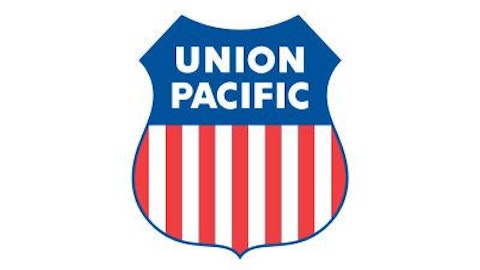Unlike Energizer Holdings (NYSE:ENR), The Goodyear Tire & Rubber Company (NASDAQ:GT), which makes rubber tires and various other rubber products and chemicals, is a bit more intricately tied to the happenings of the global economy. Specifically, weakness in new automobile demand related to austerity measures has sapped growth in Europe, and previous to 2012, high rubber prices had constrained margins. But right now looks like it could be the perfect time for a suitor seeking a brand-name product to pounce on.
To begin with, rubber prices have remained well off their highs for more than two years. Since peaking at nearly $2.81 per pound in February 2011, rubber prices have fallen back to $1.32 per pound — or roughly the same level they were at in 2008.
Source: Singapore Commodity Exchange, via Indexmundi.
With rubber being The Goodyear Tire & Rubber Company (NASDAQ:GT)’s primary expense, it gives the company the all-clear to do what it can to boost its margins and expand globally.
Second, it’s a globally known brand-name product. Even if Goodyear is struggling in Europe, it has other modes of growth, including emerging markets such as the Asia-Pacific region, which demonstrated 6% unit volume growth in the fourth quarter. The Goodyear Tire & Rubber Company (NASDAQ:GT) is going to continue to diversify its operations to Asia, Eastern Europe, and Africa to drive growth if it’s just not there domestically or in Western Europe.
Finally — and you’ll notice a bit of a theme here — it’s all about the valuation. The Goodyear Tire & Rubber Company (NASDAQ:GT)comes with a bit of inherent risk in that it boasts $2.8 billion in net debt, but it’s valued at an incredibly cheap 3.5 times its enterprise value relative to EBITDA. The Goodyear Tire & Rubber Company (NASDAQ:GT)’s full-year guidance of $1.4 billion to $1.5 billion in operating income is simply phenomenal for a company that investors say it worth just $3.4 billion. It’s a company I expect to drive into a leveraged buyout, or attract a much larger bidder looking to diversify, in the not-so-distant future.
The Clorox Company (NYSE:CLX)
Of the three companies I’m thinking could be bought out, I’d put the probability of seeing it happen to cleaning-products maker Clorox at the top of my list. The Clorox Company (NYSE:CLX) might be an inanely boring business on the surface, with home-care products and various dressings and sauces comprising its revenue source. But compared with a company like Heinz, it offers just as much, if not more, shielding from economic downturns.
The Clorox Company (NYSE:CLX) is the perfect example of stability in the consumer-goods sector. Its recently reported second-quarter results in February showed a company with an 8.5% increase in sales as volumes rose 5% and prices jumped as well. It boosted the low end of its projected EPS guidance and raised its same-store sales forecast this year to a gain of 3% to 5% from its previous forecast of 2% to 4%. May I remind you that these gains are being seen all while taxpayers have cut back on spending in lieu of higher taxes and delayed tax refunds?
The Clorox Company (NYSE:CLX) is exactly the type of company that would attract a conglomerate like Berkshire Hathaway that was looking for a stable growth story with household appeal. In the previous nine years, Clorox’s gross margin has deviated a grand total of just 360 basis points, from 41.2% to 44.8%. That demonstrates The Clorox Company (NYSE:CLX)’s stranglehold on its costs, the steady demand for its products regardless of economic conditions, and its ability to pass along commodity price increases to consumers.
You might think The Clorox Company (NYSE:CLX) looks a bit gassed with its $11 billion valuation and at 18 times forward earnings on paper, but consider as well that its produced $5.45 billion — half its market value — in just free cash flow over the past decade, and that’s enough to make any potential buyer salivate. I’m frankly stunned Clorox hasn’t attracted a bidder over the past decade, and I’d be even more stunned if it survives the next decade without a buyout offer at a reasonable premium to its current price.
There you have my guesses for three brand-name consumer goods providers set to be bought out next. Feel free to leave your own prognostications in the comments section below.
The article 3 Big Brand Names That Could Be Bought Out Next originally appeared on Fool.com.
Fool contributor Sean Williams owns shares of Dell but has no material interest in any other companies mentioned in this article. You can follow him on CAPS under the screen name TMFUltraLong, track every pick he makes under the screen name TrackUltraLong, and check him out on Twitter, where he goes by the handle @TMFUltraLong.The Motley Fool owns shares of Berkshire Hathaway and recommends Berkshire Hathaway, Energizer Holdings, H.J. Heinz, and Procter & Gamble.
Copyright © 1995 – 2013 The Motley Fool, LLC. All rights reserved. The Motley Fool has a disclosure policy.


